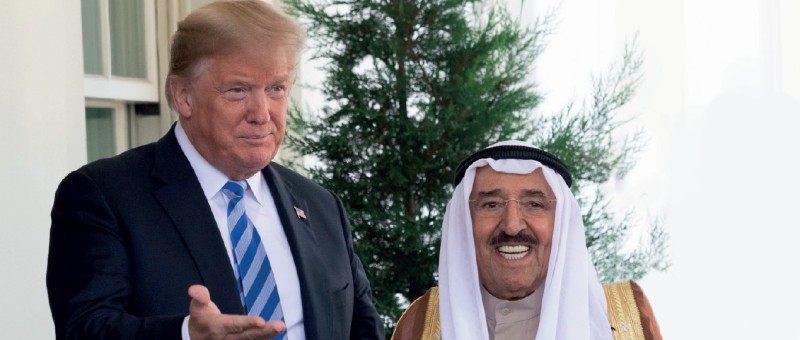The launch of the U.S.-Kuwait Strategic Dialogue in 2016 marked the beginning of a new era of stronger diplomatic, political, security, educational and commercial ties between the two nations. Leveraging on the recent momentum, Kuwait wants to expand U.S. investment to support its Vision 2035 plan to build a diversifi ed and knowledge-based economy. With hundreds of billions of dollars worth of projects in infrastructure, technology and other priority areas as part of Vision 2035, a diverse range of high-quality investment opportunities are opening up for American investors across the board.

Twenty-eight years on since the U.S.-military led Liberation of Kuwait and ties between the two nations have never been stronger, as the Gulf nation forges ahead with its New Kuwait Vision 2035 development plan to build a knowledge-based economy, less dependent on oil and driven by the private sector.
Security and defence continue to form an important part of the U.S.-Kuwait relationship. Kuwait, which took its seat as a non-permanent member of the U.N. Security Council for 2018-2019, is an important U.S. partner in the fight against terrorism and the containment of other regional threats.
“By strengthening communications with allies like Kuwait, we send a message to both terrorist organizations and regional aggressors that they cannot win,” said President Donald Trump following a meeting with the Emir of Kuwait Sheikh Sabah Al Ahmed last year.
But ties between the two nations go much further than security, spanning trade, investment, technology transfer and education. In 2016, the U.S.-Kuwait strategic dialogue (USKSD) was launched, marking the beginning of a new era of stronger diplomatic, political, security, educational and commercial ties.
“The year 2016 marked an exemplary milestone when the total U.S.-Kuwait trade reached US$6.6 billion. Today, as Kuwait sets its national long-term development plan as part of Vision 2035 to build a diversified economy, our focus is to strengthen our foreign direct investment and build stronger trade relations with the U.S.,” says Kuwait’s Minister of Commerce and Industry, Khalid Naser Al-Roudan.
Kuwait’s current direction to develop the economy in line with Vision 2035 includes supporting local innovation and the SME ecosystem, enhancing industry to increase its competitiveness, providing incentives for new strategic sectors, and developing and partnering with international companies to implement mega-projects.
“All these developments that we are witnessing today provide solid ground for the U.S. to play an even bigger role in our development efforts, through facilitated investments in a wide range of sectors, knowledge exchange, and incentivized cooperation with our SME sector,” the minister explains.
Some of America’s biggest companies are already playing their part in Vision 2035. Last year, GE Power signed and MoU with the National Fund for SME Development to support SMEs that develop digital applications for the electricity sector.
Last year, IBM pledged its support for the development of the Kuwait Digital Health Roadmap Initiative, which falls under the Vision 2035 pillar to improve the public health service.
“Our relationship with the U.S., especially after liberation, has never been as strong as it is now, although it has always been strong. Many of the American multinational companies which have their headquarters in the U.S. are starting to find room here in the country. GE, IBM, Microsoft, Oracle… these are giant American companies that are doing business in Kuwait,” says Dr. Khaled Mahdi, Secretary-General of the Supreme Council for Planning and Development.
In 2015, U.S. direct investment in Kuwait reached 293 million dollars. American investment has traditionally focused in the energy and defence sectors. But with hundreds of billions dollars of projects in infrastructure, technology and other priority areas as part of Vision 2035, a wide range of high-quality investment opportunities are opening up for U.S. investors.
And to facilitate foreign investors, Kuwait has implemented several reforms in recent years to improve the business climate, including the creation of the Kuwait Direct Investment Promotion Agency (KDIPA), which recently held a road show in Silicon Valley titled ‘Discover the Business Opportunities in a Transformed Economy’ as part of a U.S. trade mission.
“Regarding the ease of doing business, we are creating the momentum under the leadership of KDIPA,” says Dr. Mahdi. “All other Arabian Gulf countries are following in the same footsteps. We are always proud to be the pioneers, and yet we are at the same time prudent, conservative and cautious. We take small but solid steps towards the future.”
Twenty eight years ago, the U.S. led the Liberation of Kuwait. Today, as one of country’s most important economic partners, it has an opportunity to play a leading role in building the New Kuwait envisioned in the Vision 2035 plan, which will be a win-win partnership for both nations.
0 COMMENTS